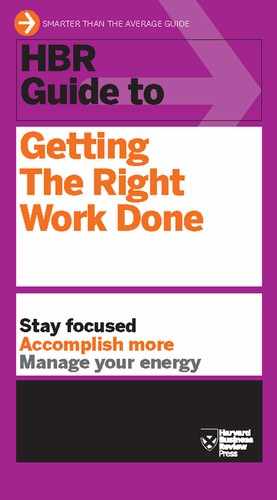Chapter 8
Stop Procrastinating—Now
by Amy Gallo
It seems that no one is immune to procrastination. When someone asked Ernest Hemingway how to write a novel, he replied, “First you defrost the refrigerator.” But putting off tasks takes a big toll on our productivity and our psyche.
Here are five principles to follow the next time you find yourself procrastinating:
1. Figure Out What’s Holding You Back
When you find yourself ignoring or delaying a task, ask yourself why. Psychiatrist Ned Hallowell says there are two types of tasks we most often defer:
- Something you don’t like to do. This is the most common one. As Hallowell says, “You don’t put off eating your favorite dessert.”
- Something you don’t know how to do. When you lack the necessary knowledge or are unsure of how to start a job, you’re more likely to avoid it.
Once you’ve identified why you’ve put something off, you can break the cycle and prevent future bouts of procrastination.
2. Set Deadlines
One of the simplest things to do is create a schedule with clear due dates for each task. “As soon as you get the project, chunk it down into a few manageable segments,” advises Teresa Amabile, coauthor of The Progress Principle. Then, assign deadlines for each task. “Put an appointment in your calendar to work on a small piece of the next segment each day to allow yourself to get it done a bit at a time,” she says. These “small wins” make the work more manageable and contribute to your sense of progress. And achieving them is much easier than trying to barrel through a complex project.
Use whatever visual cues work for you: Set reminders in your calendar, add items to your to-do list, or put a sticky note on your computer screen.
3. Increase the Rewards
We often dally because the reward for doing an assignment is too far off. To make a task feel more urgent, focus on short-term rewards. If you always procrastinate on filing your taxes, for example, focus on getting a refund by a certain date. And if there aren’t any obvious rewards, create your own. Treat yourself to a coffee break or a quick chat with a coworker once you’ve finished a task. Embed the reward into the work by making it more fun to do, like partnering with a colleague on a particularly difficult project.
4. Involve Others
One of the principles Hallowell emphasizes is “Never worry alone.” If you don’t know how to do something, ask for help. Turn to a trusted colleague or a friend for advice. Asking people to review your work can also help spur you to get started, because you know they’re expecting it.
5. Get in the Habit
“People throw up a hand and say ‘I’m such a procrastinator’ as if they have no control,” says Hallowell. “You do have control over this, and you’ll be very proud when you change it.” There are immediate benefits when you start getting things done right away, and it’s a habit you can cultivate. Amabile suggests tracking your improvement. “Spend just five minutes a day to note the progress you made, any setbacks you encountered, and what you might do the next day to enable further progress,” she says. She recommends you do this in a work diary (see “Use a 10-Minute Diary to Stay on Track,” later in this guide). Then see yourself—and talk about yourself with others—as someone who gets things done. “The most powerful event for maintaining positive inner work life is making progress in meaningful work,” says Amabile.
____________
Amy Gallo is a contributing editor at Harvard Business Review. Follow her on Twitter at @amyegallo.
______________
Adapted from content posted on hbr.org on October 11, 2011.
